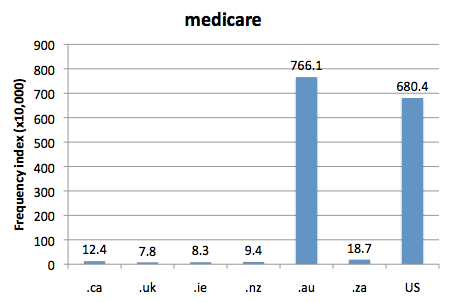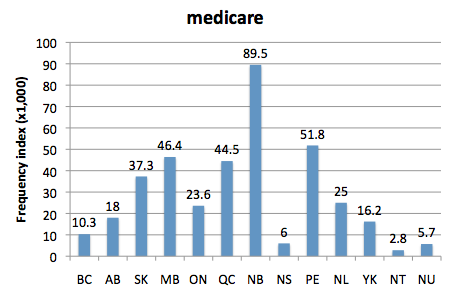DCHP-2
medicare Medicare DCHP-2 (July 2016)
n. & adj. — dated, somewhat rare
universal health care; a government-sponsored insurance program for providing medical care for all residents.
Type: 4. Culturally Significant — Universal health care for all residents developed in a two-stage process in Canada. Starting in 1957, the costs of hospital care was largely covered. By 1966, the Medical Care Act extended universal coverage to doctors, though it took some years for plans to be implemented between the federal and provincial governments.
Health care is under the jurisdiction of the provinces, which allows for varying coverage. In order to qualify for federal payments, the provinces must meet the criteria of "accessibility, universality, comprehensiveness, portability and administration" (Canadian Encyclopedia reference), which creates the smallest common denominator for services rendered to Canadians regardless of location.
Instrumental for federal health care coverage was an insurance model pioneered by Saskatchewan premier Tommy Douglas in 1961, which was answered by a doctors' strike in that province in 1962 (see the quotations from the early 1960s and the 1993 quotation). After a difficult stalemate with the province's doctors, the battle over health care was won by Douglas. By 1972, however, medicare was available in all provinces. In the US, medicare refers to subsidized health care insurance for seniors only.
Universal health care is consistently among the most important topics to Canadian voters, yet, as can be seen in Chart 1, the term medicare is not the term of choice for many Canadians, who generally prefer terms such as universal health care or simply "health care".
See also COD-2, which does not label the term as "Cdn.", but defines it as universal health care with the prefix "(in Canada").See also: denticare plan extra-billing pharmacare judicare universal health care
- In the 1960s and 1970s, medicare was likely the majority term, with New Brunswick holding on to the term the longest, as is implied by its frequent use in that province (see Chart 2). Medicare has since been replaced by plain "health care", which generally implies free access in Canada, as opposed to "private health care".
- Note that medicare means different things in Canada ('universal health care') and the US ('health care for seniors'). "Obama Care" would be somewhat of an equivalent term in the US today (2016).
References:
- Canadian Encyclopedia "Health Policy" Accessed 8 Feb. 2016
Images:

Chart 1: Internet Domain Search, 19 Feb. 2016
Chart 2: Regional Domain Search, 29 Feb. 2016